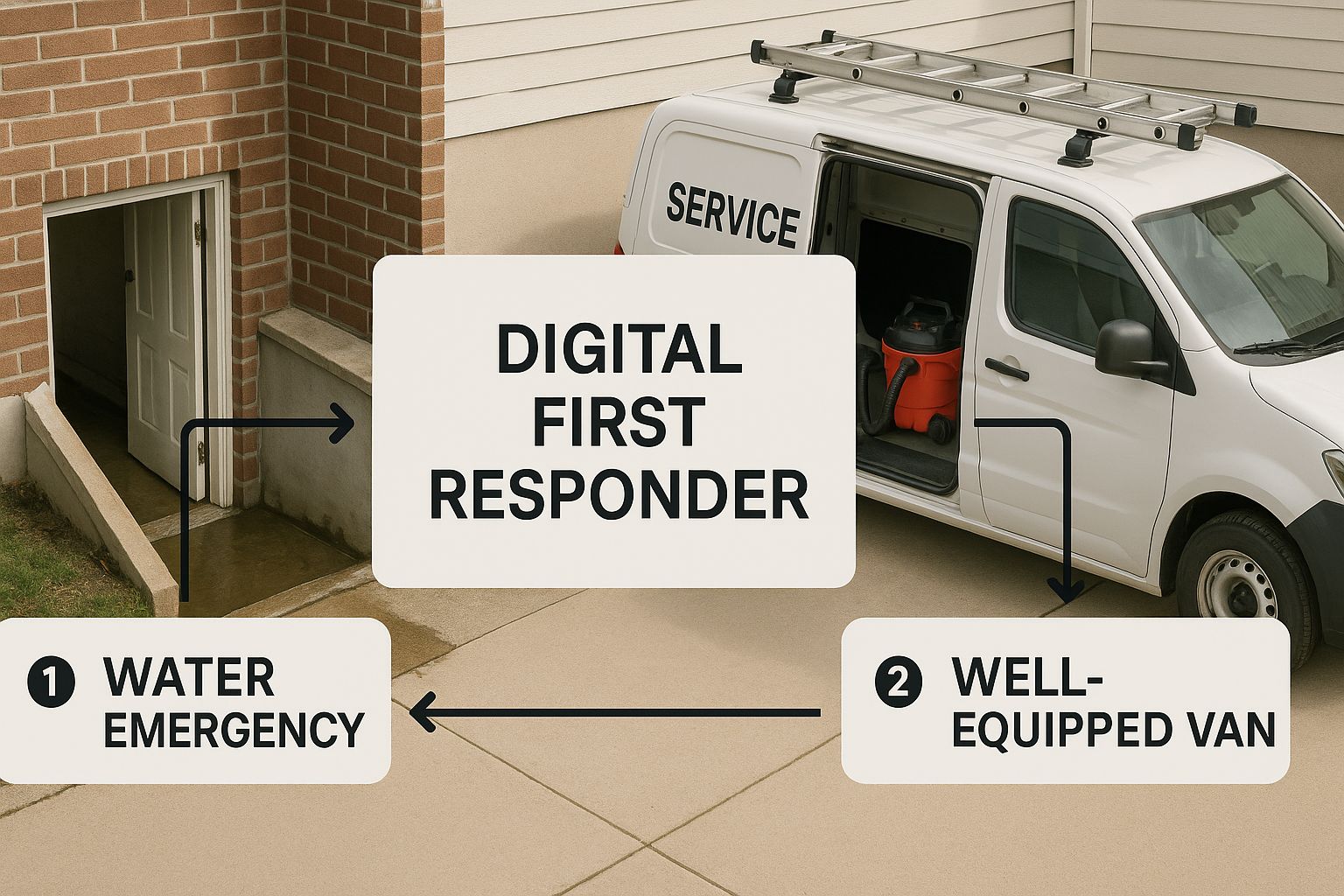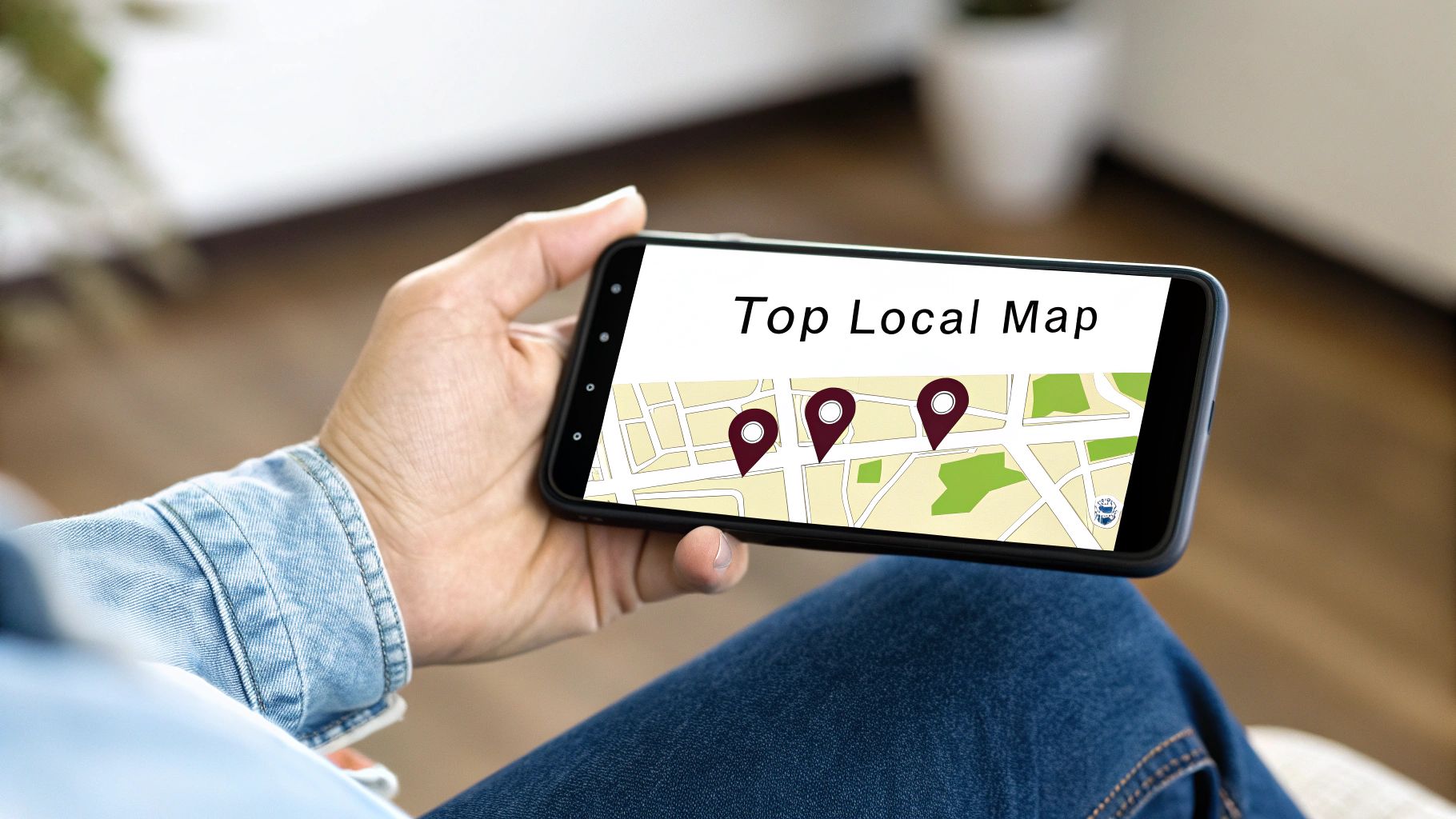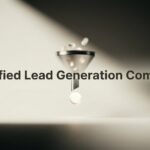When a pipe bursts and floods a basement, what's the first thing a homeowner does? They grab their phone and search. This is where effective SEO for water damage companies comes in. It's about being the digital first responder so you're the first—and only—call they make.
In Short: A solid SEO strategy ensures that when disaster strikes, your business is the first one a panicked homeowner finds online.
Your website is like your emergency truck. It has to be prepped, organized, and ready to roll instantly. On-page SEO is that critical prep work. If you skip it, you're a great restoration company that nobody can find during a crisis.
A strong on-page foundation turns your site into a machine for converting frantic visitors into paying customers. This isn't just for Google; it's about giving a stressed-out person a clear, fast path to a solution.
H2: On-Page SEO: Your Digital First Responder Kit
Let's get into the nuts and bolts of turning your website into that go-to resource.
H3: Speaking The Language Of Urgency
When water is rising, people aren't searching for "hydro-mitigation solutions." They use simple, direct phrases. Your keyword strategy must mirror that reality. The goal is to show up for hyper-local, high-intent searches that mean, "I need help right now!"
Focus on keywords like these:
- Emergency water removal [your city]
- 24/7 flood cleanup [your neighborhood]
- Burst pipe repair near me
- Basement water damage help [your county]
These terms show a clear and immediate need to hire. Targeting them positions your business as the direct solution to an active crisis.
H3: Structuring Your Site For Crisis Mode
A confusing website means a lost customer. It's that simple. A visitor needs to know within seconds that you can solve their specific problem. This requires a clean site structure with dedicated pages for each core service. Don't just lump everything under one "Services" tab.
In Short: A well-structured website guides a frantic homeowner directly to the help they need, just like a 911 dispatcher.
Create distinct, optimized pages for every service you provide:
- Water Damage Restoration
- Flood Cleanup
- Mold Remediation
- Sewage Backup Cleanup
- Fire & Smoke Damage
Each page needs to explain the problem, detail your solution, and provide an immediate, obvious way to get help. This infographic shows how your website acts as a critical tool in an emergency.

As the image shows, your online presence is often the first point of contact, making a strong digital foundation as crucial as your physical equipment.
Here's a quick checklist for your website's on-page basics.
H3: Core On-Page SEO Checklist for Restoration Websites
| SEO Element | Why It Matters for Water Damage Companies | Quick Tip |
|---|---|---|
| Unique Title Tags | This is the first thing people see in search results. It must communicate "EMERGENCY HELP!" | Use your main keyword + city + a benefit. *Example: "24/7 Water Damage Restoration in Austin |
| Meta Descriptions | This is your 160-character pitch to get the click. | Mention 24/7 service, your phone number, and a call to action. Example: "Flooded basement? Call now! We offer 24/7 emergency water removal in Austin. Licensed & Insured. Get a free estimate." |
| Service-Specific Pages | Google ranks pages, not entire websites. A dedicated page for "sewage backup" will outrank a generic "services" page. | Create separate pages for each service (water, fire, mold) and optimize each for relevant local keywords. |
| Mobile-First Design | Panicked homeowners search on their phones, not desktops. | Your site must be fast and easy to use on a mobile device. Your phone number should be a "tap-to-call" link at the top. |
| Clear Calls-to-Action | When someone is stressed, they need to be told exactly what to do. | Use large buttons and text like "Call for Immediate Help" or "Get Emergency Service Now." |
Getting these elements right is the bedrock of a successful online strategy.
H3: The Growing Demand For Restoration Services
The need for your services is growing. The United States has seen a massive jump in costly natural disasters, with an average of 20 billion-dollar climate events per year from 2019 to 2023. This trend has skyrocketed the demand for water damage restoration.
The U.S. restoration industry is on track to become a $7.1 billion market by 2025, with over 35,000 firms competing for the same customers.
This competition makes a powerful online presence more critical than ever. To be that "digital first responder," it's essential to understand proven strategies for building a strong online presence. A smart SEO plan makes you stand out and connect with homeowners when they need you most.
H2: Winning the Local Map Pack for Emergency Calls
When a pipe bursts, nobody scrolls to page two of Google. They call one of the top three companies in the local map pack. For a water damage business, this is the entire ballgame.

Let's break down how to dominate that critical space. Your Google Business Profile (GBP) is your digital storefront for urgent, middle-of-the-night calls. It's more than just your business info; it's about proving to Google you are the most relevant, responsive, and trusted solution in your service area.
H3: Your Google Business Profile Is Your Emergency Dispatch
Think of your GBP as the digital 911 dispatcher for your business. It needs to be perfectly tuned for urgent local searches.
First, your business name, address, and phone number (NAP) must be 100% consistent across the internet. I mean identical—on your website, GBP, and every local directory. A tiny difference like "St." versus "Street" can confuse search engines.
Next, get specific with your service categories. Don't just pick "Restoration Service." Be specific:
- Water Damage Restoration Service
- Mold Remediation
- Sewage Cleanup Service
- Fire Damage Restoration Service
This detail helps Google match you with the exact crisis a homeowner is facing. Knowing how to optimize your website for local search is what separates the businesses that get calls from those that don't.
H3: Using Google Posts To Show You're Ready to Roll
Google Posts are an overlooked tool in this industry. They are mini-updates on your profile that prove you’re available and on the job.
Use them to highlight things like:
- Recent Job Photos: Post before-and-after shots. A caption like, "Another basement saved in Northwood! Our crew was on-site in under 45 minutes for this burst pipe" works wonders.
- 24/7 Availability: Create simple posts that remind people you're an around-the-clock service.
- Emergency Tips: Offer quick advice, like "What to do while you wait for our emergency crew to arrive."
These posts signal to customers and Google that you are active and responsive.
H3: People Also Ask: Local SEO Questions
Q: How do I get my business to show up on Google Maps for restoration?
A: Create and fully verify a Google Business Profile. Fill out every single section—services, service areas, hours, photos. Then, encourage customer reviews and consistently add Google Posts to show you're an active, relevant business.
Q: What are the 3 main components of local SEO?
A: Local SEO boils down to three core pillars:
- Proximity: How close your business is to the searcher. Clearly define your service areas in your profile.
- Relevance: How well your profile matches the search. You control this with your business categories, services, and content.
- Prominence: How well-known your business is. This is built on online reviews, local citations (directory listings), and backlinks from other local websites.
Q: What are local SEO citations?
A: Local citations are online mentions of your business's name, address, and phone number (NAP). They appear in directories like Yelp and Angi. Consistent citations across reputable sites build trust with Google and confirm your business's location and legitimacy.
H3: Building Local Authority That Google Trusts
Beyond your GBP, you need to build local signals that reinforce your authority. Building local citations is a crucial first step. This just means getting your business listed in online directories with consistent NAP information.
Geo-tagging your job photos is another great technique. Before you upload photos to your website or GBP, add location data to the image files. This tells Google exactly where you did the work, strengthening your connection to specific neighborhoods.
Finally, actively ask for customer reviews—and guide them to mention specific services and their location. A review that says, "They did an incredible job with our basement flood cleanup in the Brookside area," is pure SEO gold.
H2: Building Trust Through Your Online Reputation
https://www.youtube.com/embed/TNoZRgUWK-I
Let's be honest. When someone calls you, it's one of the worst days of their life. You're not just a contractor; you're a first responder. Trust is everything.
Before they call, they're searching online. Your online reputation is the first impression that tells a panicked homeowner you're the right crew for the job. This is where smart SEO for water damage companies moves beyond keywords and becomes about reliability.
H3: How to Get More Reviews (Without Being Pushy)
Getting good reviews doesn't have to be awkward. The best time to ask is right after the job is done—that moment when the homeowner is breathing a huge sigh of relief.
Timing is everything. Train your techs to make this part of their final walkthrough. It's a simple, human conversation.
"We're so glad we could get things back to normal for you. If you have a moment later, a review of our work on Google would really help other families in your situation find us."
This reframes the request. It’s not about you; it's about helping their neighbors. You can also send a follow-up text or email with a direct link to your Google Business Profile to make it simple.
H3: Handling All Kinds of Customer Feedback
How you respond to reviews—good and bad—is a public performance. A professional response can even turn a negative review into a positive.
- For great reviews: Don't just copy-paste "Thanks!" Personalize it by mentioning a specific detail.
- For tough reviews: Respond quickly and take it offline. Acknowledge their issue publicly, but resolve it privately. "We're sorry to hear about your experience. We want to make this right. Please call our office so we can address your concerns directly."
Never get into a public argument. How you handle criticism says more about your company than a five-star review ever could.
H3: People Also Ask: Reputation Questions
Q: How should a contractor respond to a bad review?
A: Respond with empathy and professionalism. Acknowledge their frustration, apologize that their experience wasn't up to standard, and give them a clear path to get it fixed. This shows everyone reading that you take customer satisfaction seriously.
H3: Turning Success Stories into Powerful Social Proof
Reviews are gold, but testimonials and case studies on your website are your secret weapon. They let you control the story and build social proof—undeniable evidence that you know what you're doing.
A great case study for a water damage job is simple:
- The Problem: Get right to it. "A second-floor pipe burst, flooding the main level."
- The Response: Highlight your speed. "Our team was on-site within 45 minutes."
- The Solution: Showcase your expertise. "We used advanced drying equipment to save the original hardwood floors."
- The Result: Let the customer do the talking with a powerful testimonial.
A 2024 industry survey showed the biggest headache for contractors was finding good people. A strong online reputation doesn't just attract customers—it also attracts top talent. Check out more 2024 restoration industry trends and insights on randrmagonline.com.
H2: Creating Content That Solves Urgent Problems
When a pipe bursts, the last thing a homeowner wants is a sales pitch. They're panicked. They're typing questions into their phone, looking for an immediate answer.
Your website content needs to be that calm voice in the chaos.
In Short: Stop selling your services and start solving their immediate problems with helpful, clear content.
Many companies miss this. They focus on selling instead of solving. To win at SEO, think like a first responder.

When your content provides clear guidance that helps a homeowner right now, you instantly build trust. You become the expert they need to call.
H3: Answer Their Most Pressing Questions
Forget generic blog posts. Your content needs to target the high-intent keywords people search for during an emergency.
Find these in the "People Also Ask" section on Google. Your content calendar should be packed with articles that answer these urgent questions:
- What should I do in the first 30 minutes of a flood?
- How do I shut off my home’s main water valve fast?
- Is it safe to stay in my house with this much water damage?
- How can I spot hidden mold after a small leak?
These topics grab the attention of people ready to make a decision. 78% of local mobile searches lead to a purchase within a day. Capturing that urgent traffic is everything.
H3: Structure Your Content for a Crisis
Nobody reads when they're stressed—they scan. A wall of text will send a panicked homeowner away. Your content must be built for speed and clarity.
- Keep paragraphs short. Two to three sentences, max.
- Use clear H3 subheadings. Break the article into logical sections.
- Use bullet points. They're perfect for step-by-step instructions.
- Use bold text. Make critical information impossible to miss, like “turn off the electricity” or “call your insurance agent immediately.”
This isn't just good user experience; it's a core part of effective SEO for restoration companies. It shows search engines you're providing direct, relevant answers.
H2: Technical SEO: Keeping Your Website's Engine Tuned
A slow, clunky website is like showing up to an emergency with a flat tire. It undermines your ability to help. When a homeowner is panicking about a burst pipe, they don't have time to wait for your site to load.
In Short: Technical SEO ensures your website runs smoothly, so Google can understand it and customers can reach you without stress.
This is a non-negotiable part of a solid SEO strategy for any water damage company.
H3: Your Site Must Be Mobile-First, No Exceptions
Picture your ideal customer: standing in water, searching on their smartphone. If your website isn't built for that scenario, you're losing the job.
Mobile-first means designing the experience for the mobile user from the ground up.
- Big, Clickable Phone Numbers: Your number needs to be at the top of the screen as a "tap-to-call" button.
- Simple, Thumb-Friendly Menus: Navigation must be dead simple.
- Blazing Fast Speed: If your site takes more than three seconds to load, they're gone.
H3: How Fast Is Your Website, Really?
You don't have to guess. Use a free tool like Google's PageSpeed Insights. Just enter your URL, and it will give you a score and a list of what to fix. The biggest culprits are often large images or bloated code.
H3: What is Schema Markup?
Think of schema markup as a secret language you speak to Google. It’s code you add to your site that clearly labels your key business information—name, address, phone number, and services.
For a restoration company, this is a game-changer. You can use schema to tell Google you offer 24/7 emergency services. This helps you show up for a search like "emergency water removal near me" at 2 AM.
H3: Why You Need to Hunt Down and Fix Broken Links
A broken link (a 404 error) is a digital dead end. For a user, it's frustrating. For Google, it's a red flag that your site might be outdated. Regularly fixing broken links is basic website hygiene that pays off.
Technology is constantly technology is shaping the restoration industry, with smart drying systems and flood sensors becoming more common. A technically sound website is the foundation that ensures all your other efforts—great content, your local profile, and five-star reviews—get seen by the customers who need your help right now.
H2: Common SEO Questions for Restoration Companies
Even with a solid plan, you'll have questions. Let's cover some of the most frequent ones we hear from restoration business owners.
H3: How Long Does SEO Take to Work for a Restoration Business?
This is the big one. SEO isn't an overnight fix.
You can expect to see movement in your local map pack rankings within 3 to 6 months. This is especially true if you optimize your Google Business Profile and build local citations from the start.
For big, competitive keywords like "[your city] water damage," getting a solid spot on the first page often takes closer to 6 to 12 months. The key is consistency. SEO compounds, so the work you do today makes tomorrow's efforts more powerful.
H3: What’s More Important: Local SEO or Traditional SEO?
For a water damage company, it's an easy answer: local SEO is everything. Your customers are in your service area, and they need you now. Showing up in the local map pack is far more valuable for emergency jobs than ranking for a broad, national term.
In Short: Local SEO gets your truck to the flooded basement. Start there.
Of course, traditional SEO—like writing helpful blog posts—builds your website's overall authority, which boosts your local rankings. They work together, but your immediate focus must be winning locally. A dedicated water damage SEO company can help strike this balance.
H3: How Much Should a Restoration Company Spend on SEO?
The answer is "it depends." Most small to mid-sized restoration companies invest between $1,500 and $5,000 per month for a complete strategy. This usually covers on-page work, content, citation building, and link building.
Think of it as an investment in a lead-generation machine. One good water mitigation job can easily pay for several months of your SEO budget.
- Lower End ($1,500/mo): This usually covers foundational local SEO and on-page essentials.
- Mid-Range ($2,500+/mo): This adds consistent content creation and proactive link building.
- Higher End ($5,000+/mo): This is for aggressive campaigns in competitive cities or for multiple locations.
The right number depends on your market and growth goals. Be wary of cheap offers; they almost always lead to slow results. Real growth requires a real investment.
Ready to stop wondering and start ranking? The team at Clicks Geek specializes in turning your website into a powerful lead-generation engine. We build custom SEO and Google Ads strategies that get your phone ringing with high-quality, emergency jobs. Get your free proposal today and see how we can fuel your growth.
Want More Leads for Your Business?
Most agencies chase clicks, impressions, and “traffic.” Clicks Geek builds lead systems. We uncover where prospects are dropping off, where your budget is being wasted, and which channels will actually produce ROI for your business, then we build and manage the strategy for you.






